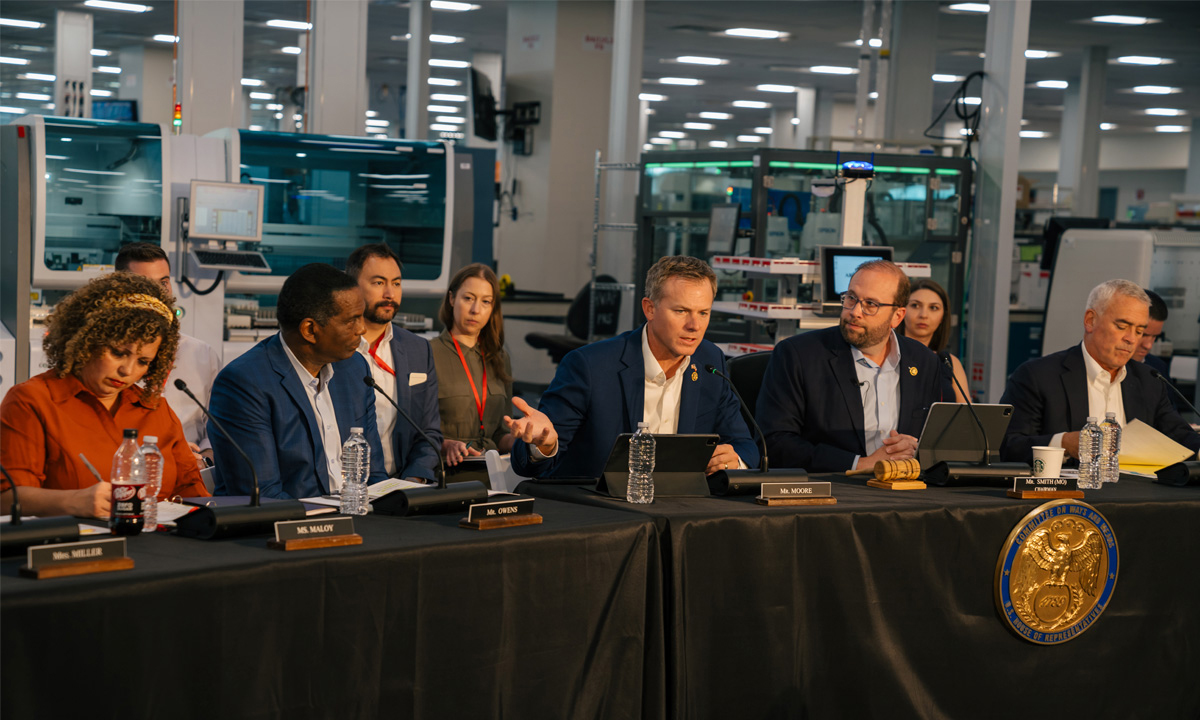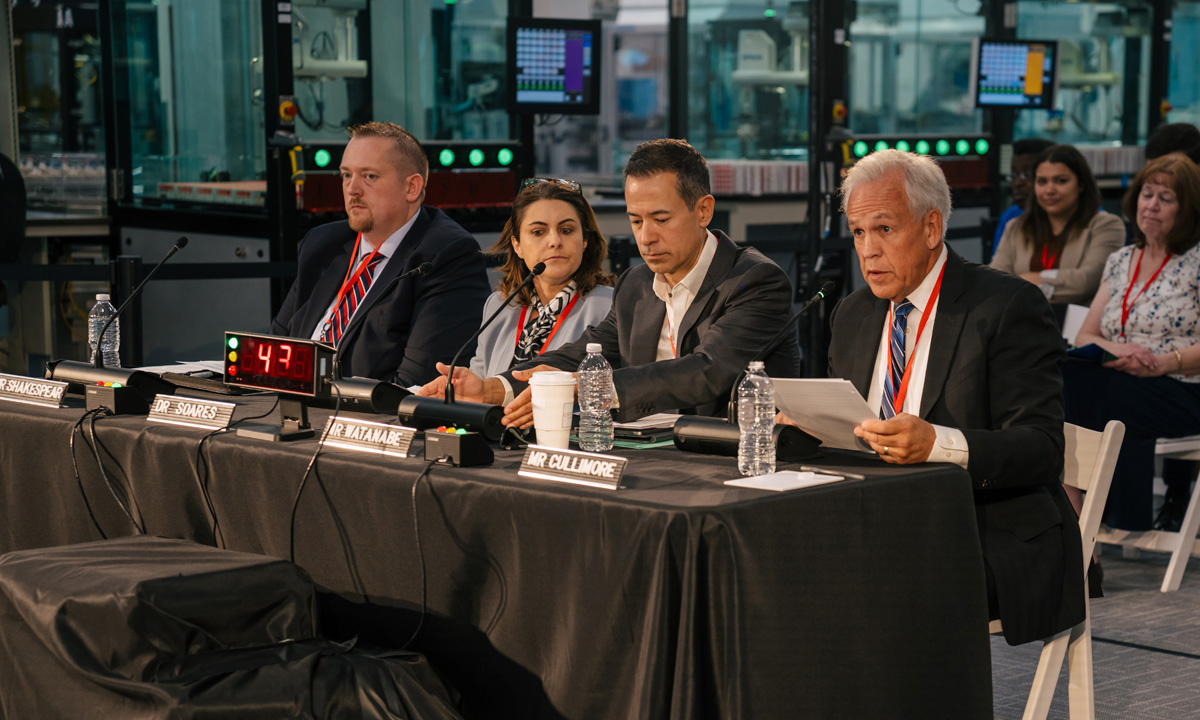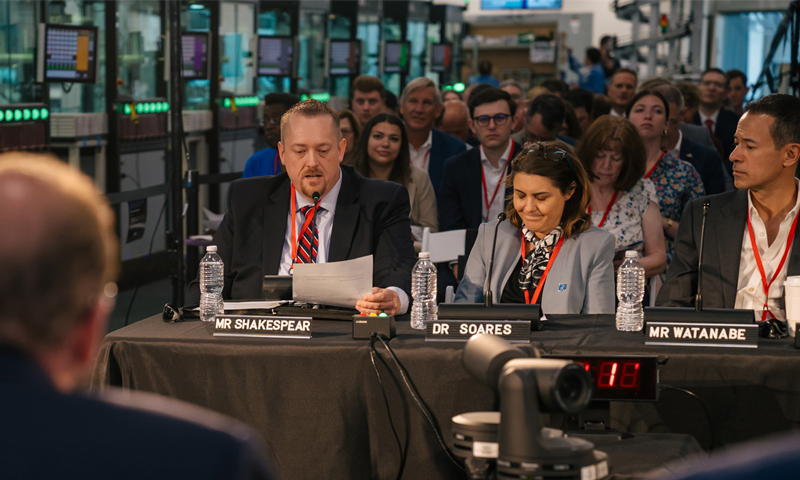
Representative Blake Moore (R-Utah, District 1) speaks during a House Committee on Ways and Means hearing held at ARUP Laboratories. Pictured from left to right are Celeste Maloy (R-Utah, District 2), Burgess Owens (R-Utah, District 4), Moore, Jason Smith (R-Missouri, District 8), and Brad Wenstrup, MD (R-Ohio, District 2).
Healthcare innovation requires economic conditions that allow for investment and supportive regulatory structures, ARUP Laboratories’ chief medical officer (CMO) said in written comments submitted ahead of the U.S. House of Representatives Committee on Ways and Means field hearing held at ARUP Laboratories today.
In his comments, Jonathan Genzen, MD, PhD, ARUP’s CMO and senior director of governmental affairs, said ARUP is proud and grateful to have been chosen as the site for the field hearing on the topic, “Access to Health Care in America: Unleashing Medical Innovation and Economic Prosperity.” ARUP has been committed to innovation that improves patient care since its inception 40 years ago and is at the forefront of test development for rare disorders, Genzen wrote.
Genzen urged the committee to consider advancing the Saving Access to Laboratory Services Act (SALSA), which he wrote would help remedy the unintended negative impacts of the Protecting Access to Medicare Act (PAMA).
“Laboratory reimbursement cuts under Medicare as a result of 2014’s PAMA—paradoxically, at a time when supply and labor costs for in vitro diagnostics continue to increase—hinder medical innovation. These cuts, scheduled to go into effect in 2025, would limit testing services upon which doctors and patients rely,” Genzen said.
Genzen also wrote, “Overregulation or regulatory structures that place an undue burden on clinical laboratories—for example, the FDA final rule on laboratory-developed tests (LDTs) and the Verifying Accurate Leading-edge (IVCT) Development Act (VALID Act)—risk significantly limiting diagnostic innovation and future diagnostic options for our citizens.” Genzen reiterated ARUP’s commitment to working with the administration and Congress to consider oversight structures that both protect public health and support innovation in healthcare.
Invited witnesses at the hearing included Frank Watanabe, president and CEO of Arcutis Biotherapeutics; Kelvyn Cullimore, president and CEO of BioUtah; Heloisa P. Soares, MD, PhD, an oncologist with a focus on gastrointestinal and neuroendocrine cancers at the Huntsman Cancer Institute at the University of Utah; and Kasey Shakespear, a rural health champion who spoke about his son’s rare kidney disease.

Shakespear shared that his unborn son was diagnosed with bilateral renal agenesis (BRA), a congenital condition in which the fetus does not develop kidneys and will likely die, and said his wife found an innovative clinical trial for treatment that forced the family to temporarily relocate from southern Utah to Pasadena, California. Shakespear said it has been difficult for his family to manage travel for care and endless appointments, but his son is now 3 years old and waiting for a kidney transplant.

“Our story stands as a testament to the innovations in technology that our healthcare system has to offer … innovations [that] brought lifesaving procedures for my son, but our story is not representative of so many others. … I applaud this committee for your efforts to improve care, especially in rural communities,” Shakespear testified.
The hearing brought 10 members of Congress to ARUP’s Automated Core Lab, including Rep. Blake Moore (R-Utah, District 1), whose district includes ARUP Laboratories and who serves on the Ways and Means Subcommittee on Health, Rep. Celeste Maloy (R-Utah, District 2), and Rep. Burgess Owens (R-Utah, District 4).
Committee Chairman Jason Smith (R-Missouri, District 8) opened the field hearing by thanking ARUP for hosting and said, “The next groundbreaking cure or treatment will only be found because of strong support for research and development. … One of the first steps to growing R&D is cutting red tape.”
Moore echoed Smith’s thanks to ARUP and added, “Utah has some of the most innovative and fastest growing life science sectors in the country. … We appreciate the productivity that comes from this part of the First District.”
In addition to the hearing, 16 Utah life sciences companies hosted an innovation showcase to highlight the important contributions Utah makes to healthcare innovation. Utah leads the nation in job growth in the life sciences industry, and the more than 1,000 life sciences companies in Utah produce $1.3 billion in gross domestic product. The companies who participated in the innovation showcase included ARUP and the following:
- Altitude Lab, a biotech and healthcare incubator offering lab and office space in downtown Salt Lake City
- Blackrock Neurotech, which produces innovative brain-computer interface technology to help people walk, talk, hear, see, and feel again
- bioMérieux, which advances and creates innovative testing for an array of pathogens and infectious diseases
- Cūrza, which is developing a new class of antibiotics in the global fight against antimicrobial resistance
- DiscGenics, a developer of allogeneic, cell-based regenerative therapies for musculoskeletal degeneration
- Edwards Lifesciences, a global leader in patient-focused medical innovations for structural heart disease, including replacement heart valves
- Epitel, a digital health company modernizing brain health solutions to improve seizure monitoring and detection
- Fluidx Medical Technology, which develops innovative embolic devices focused on ease of use, controlled delivery, and durable occlusions
- Foldax, which is reinventing the heart valve, from material to manufacturing, to deliver valves designed to last a lifetime
- Halia Therapeutics, which is pioneering a pipeline of novel therapeutics to address chronic inflammatory and neurodegenerative diseases
- Huntsman Cancer Institute, a National Cancer Institute-designated cancer research facility and hospital on the University of Utah campus
- Merit Medical, which started with development of the plastic syringe and is now growing a global portfolio of products for use in oncology, cardiac intervention, critical care, and more
- Seek Labs, which creates new solutions in point-of-care molecular diagnostics and CRISPR-based pharma technologies to revolutionize disease detection
- Stryker Neurovascular, which provides less invasive, innovative solutions for ischemic and hemorrhagic stroke care, as well as education and clinical support
- The University of Utah Technology Licensing Office, which facilitates technology transfer from university inventions, supporting inventors from idea to market
Read ARUP’s written comment here.
Watch the hearing here.
Learn more about ARUP’s Automated Core Lab here.
Bonnie Stray, bonnie.stray@aruplab.com
















